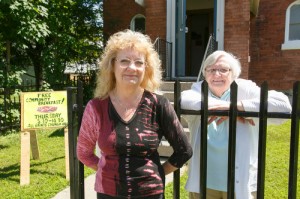
Watch this video about Reach Grants.
By Stuart Mann
As part of their Lenten study, the Rev. Veronica Roynon and Sue Savage read A World Worth Saving, by George Hovaness Donigian. They were moved by the author’s words to seek out and respond to the needs of their community.
One chapter in particular, called “Feeding Others and Starving Our Guilt” touched their hearts. “That chapter gave birth to what we felt we were being called by God to do – to reach out to those who have a spiritual, emotional and real hunger,” says Ms. Savage.
Based at All Saints, Penetanguishene, the women see needs around them every day. Local jobs are hard to come by, so many people survive on government assistance. About 2,000 outpatients of the Waypoint Centre for Mental Health Care live in the area in low rent housing and halfway houses.
The pair decided to launch a monthly breakfast club at the church, to provide a hot meal and friendship to anyone who came through the doors. “We wanted to bring friendship to each guest, and, above all, to let them know that they have value and are loved – not just by us but by God,” says Ms. Savage, the parish administrator.
They shared their idea with June Marion, the parish’s outreach coordinator, who quickly came on board. To help with the start-up costs, they applied to the diocese for a Reach Grant. These are small, one-time grants, between $500 and $5,000, to help churches and individuals turn their ideas for mission into reality.
They filled out a grant application for $2,000, then were invited down to the Diocesan Centre in Toronto to pitch their idea to a three-person panel known as “the dragons,” named after the popular TV show Dragon’s Den.
The Dragon’s Den format for a Reach Grant is simple. Applicants are given five minutes to tell the panel about their idea and how it will reach those who do not currently attend church. They also have to describe how their idea will create a Christ-centred community. The dragons make their decision by the end of the day, and Diocesan Council gives the final approval.
The dragons were so moved by the women’s plan to start a breakfast club that they not only approved the grant but raised it to $5,000 so the church could buy a new stove and the meal could be offered twice a month.
“It feels great,” says Ms. Marion. “I grew up in a foster home and I know what children have to deal with. There is a need for this here.”
The first breakfast was served in the church hall in late July. On the menu was plenty of hot food, orange juice and fresh fruit. Ten people showed up, including a man who cycled over Midland.

“This is good ministry because they read their context – they looked at the place where they were planted, they looked at what people needed and they looked at what they were able to give,” says the Rev. Canon Susan Bell, the diocese’s Canon Missioner.
Canon Bell’s job is to help clergy and lay leaders build awareness of missional opportunities in the diocese. She says small start-ups like the one in Penetanguishene are exactly the right way for the Anglican Church to share the faith with others.
“I really believe this is the way we’re going to experiment our way into the kingdom,” she says. “We can build some confidence and capability around mission just by doing and thinking and engaging in the small things, and then maybe that will turn into something a little bit larger.”
Reach Grants, she says, play a critical role in that. “If any idea is being held back because it needs $800, than a grant makes it possible,” she says.
Since they were created three years ago, Reach Grants have funded 44 missions across the diocese, launching everything from youth programs to farmers markets. To date, $145,000 has been disbursed. The number of grant applications has grown each year.
“That’s why I get so excited, because of the tremendous creativity that is out there,” says Canon Bell. “People are just beginning to tap into it. There’s a lot of energy around it. We’re hearing, ‘I have this idea, what do you think?’ several times a week now.
“The ideas are really coming from the right place: a want to share a living faith in Jesus Christ, so that people’s lives and hearts are changed. That’s a different place from where we’ve started before: we’ve been worried about survival; now we’re thinking about transmitting the faith, and that’s where the energy is.”
She says the missions help the diocese learn about what is working and what isn’t. “We’re learning that you cannot have cookie-cutter solutions to mission. You need to watch, know your people, have sympathy and know what God is calling you to do in your context. The two big lessons we’ve learned are that every mission is a bespoke mission – it’s tailor-made for those people at that time, in that place – and that everybody is responsible for mission because it’s in our DNA as Christians.”
The next deadline for Reach Grant applications is Oct. 24.